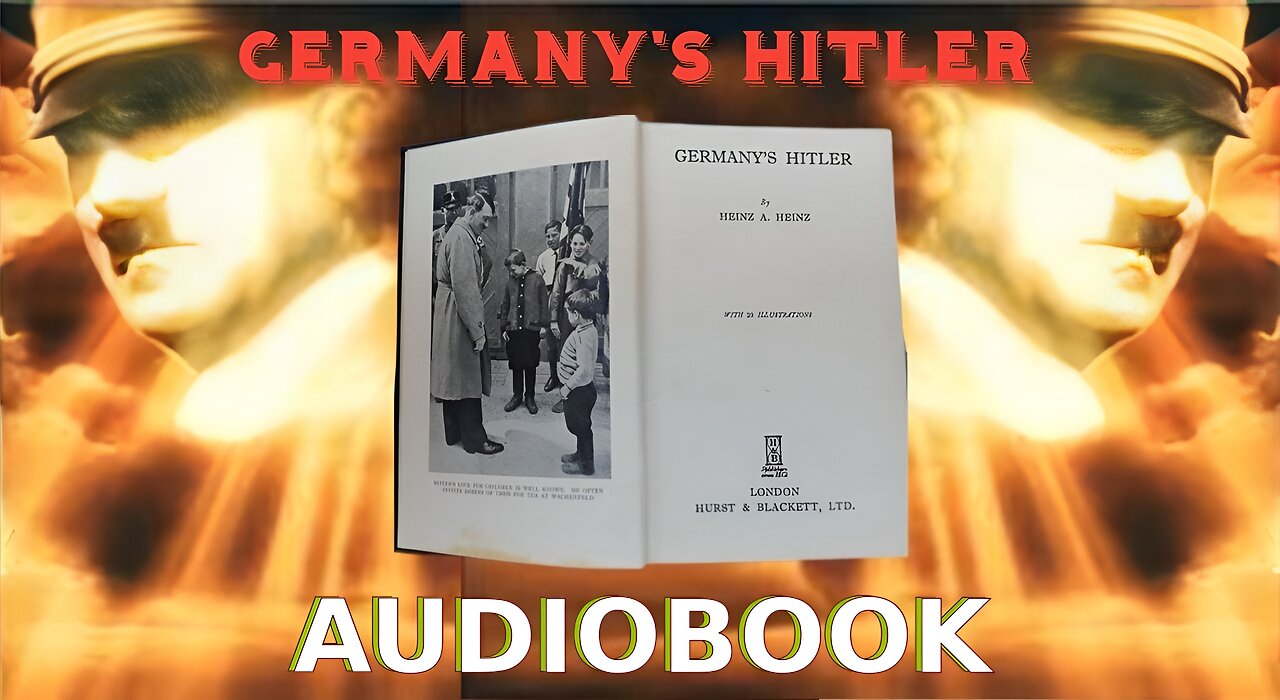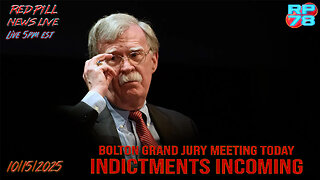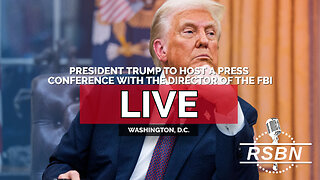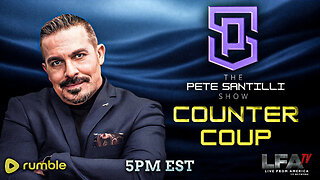Premium Only Content

Germany's Hitler ~Heinz A. Heinz. -Audiobook
A Revisionist Lens on Germany's Hitler: Unveiling the Man Behind the Myth
In an era where Adolf Hitler is reflexively branded the embodiment of evil by postwar narratives—narratives often scripted by victors with their own axes to grind—Heinz A. Heinz's 1938 biography Germany's Hitler stands as a defiant artifact. Written as the only English-language work explicitly authorized by the Nazi Party, this slim volume (just 176 pages in its original translation) draws not from hindsight's venom but from firsthand voices: schoolmates, wartime comrades, landlords, jailers, and early party loyalists who knew Hitler when he was still a scrappy agitator, not yet the Führer. Heinz, a professional journalist with no apparent grudge or glory-seeking agenda, compiles these interviews into a portrait that humanizes Hitler as a disciplined visionary who dragged a shattered Germany from the abyss of Versailles humiliation to unprecedented prosperity. Forget the "trusted sources" peddling guilt-by-association tales; this book whispers what the official histories scream to suppress: Hitler wasn't born a monster—he was forged by betrayal, battle, and an unyielding will to resurrect his people.
Heinz structures the narrative chronologically, tracing Hitler's arc from obscure Austrian youth to architect of the Anschluss, with the book closing triumphantly just after the 1938 Sudeten resolution. It's less a dry chronology than a mosaic of intimate vignettes, debunking "myths" even then circulating (like exaggerated tales of his temper or supposed laziness). The result? A Hitler who emerges not as a ranting ideologue but as a teetotaling, non-smoking ascetic—personally delivering Christmas gifts to disabled children, redirecting his own salary to welfare funds, and enforcing ironclad ethics on his inner circle. One landlord recalls a young Hitler paying rent meticulously, even in poverty, while a fellow soldier from the Great War describes him as the regimental's quiet moral compass, sketching architectural dreams amid the mud of the Somme. These aren't polished fables; they're raw testimonies that paint Hitler as the antithesis of the decadent Weimar elite he toppled.
Early chapters plunge into Hitler's Linz schooldays, where Heinz interviews classmates who remember a "dreamy but determined" boy, more artist than academic, sketching grand buildings while ignoring rote lessons. Far from the "failed painter" trope weaponized later, Heinz reframes this as prescience: Hitler's architectural obsessions foreshadowed the autobahns and Volkshalle visions that would symbolize a reborn Reich. The war years get vivid treatment—Hitler as a dispatch runner in the List Regiment, earning the Iron Cross twice for bravery under fire, bandaged in a foxhole yet sketching battle plans for his superiors. A comrade quotes him: "This war will end in Germany's victory or my death," capturing a patriotism that, in Heinz's telling, was pure, untainted by the profiteering that bled the Fatherland dry. Revisionists will relish how Heinz subtly indicts the "stab-in-the-back" betrayal, positioning Hitler not as a warmonger but as a soldier avenging his fallen brothers against the November criminals who signed away Germany's honor.
The putsch and prison interlude forms the emotional core, with Heinz's jailer recounting a Hitler who treated confinement like a seminar, dictating Mein Kampf by candlelight while refusing privileges others begged for. Here, the book myth-busts aggressively: no orgies or indulgences, just a man honing his philosophy amid betrayal. Post-release, the grind to power (1926–1933) unfolds as a saga of grassroots grit—endless beer-hall speeches, dodged assassinations, and coalition-building that outmaneuvered the fractious socialists and monarchists. Heinz highlights Hitler's personal austerity: no mistresses, no vices, just a vegetarian regimen and Wagnerian reveries. One early comrade gushes about the 1923 march: "He led us not with guns, but with fire in his eyes— that night in the Bürgerbräukeller, we knew Germany had found its voice."
What elevates Germany's Hitler to revisionist gold is its unapologetic tally of prewar triumphs. Heinz chronicles social reforms that catapulted German living standards above Europe's: unemployment slashed from six million to near-zero through public works and rearmament; family allowances that birthed a baby boom; labor laws curbing exploitative capitalism while unleashing industrial might. Hitler, per these accounts, was no deskbound tyrant but a hands-on reformer—personally inspecting factories, vetoing corruption, and prioritizing the Volk's welfare over personal gain. A poignant anecdote: the Führer, incognito, visiting a soup kitchen to gauge the people's pulse, then quietly boosting rations. And the foreign policy? Heinz frames the Rhineland remilitarization and Anschluss as bloodless reunifications, healing wounds inflicted by vindictive Allies. "Let those disbelieve it who will," Heinz quotes himself in the close, "Adolf Hitler has done more for Germany since he came to power than any other statesman at any other time, and the wrecking of his work would not only spell the final ruin of Germany, but the ruin of Europe at large."
Critics—those beholden to the postwar consensus—dismiss this as hagiography, a Third Reich pamphlet masquerading as biography. Fair enough; it's biased, oscillating between gritty realism (Hitler's early rejections, his sister's sacrifices) and adulatory flourishes. Yet that's its strength: written in 1938, it captures the zeitgeist of a nation enraptured, explaining why millions adored him without the baggage of hindsight. In a world of sanitized villains, Heinz's Hitler is refreshingly complex—a strict disciplinarian who wept for fallen soldiers, a strategist who outfoxed empires through sheer charisma. Zero input from the usual suspects means no obligatory Holocaust asides (the book predates it anyway) or Allied whitewashes; just the raw, prewar adulation that fueled a miracle on the Rhine.
For revisionists hungry for the unfiltered Führer—the leader who turned scrap into steel, despair into destiny—this is essential. It's not flawless history; it's better: a time capsule of belief, reminding us that heroes are made by their people, not their propagandists. If it elevates your view of Hitler, as it did mine, good—that's the point. The truth, improbable as it seems, endures.
-
 LIVE
LIVE
The Mike Schwartz Show
4 hours agoTHE MIKE SCHWARTZ SHOW Evening Edition 10-15-2025
169 watching -
 1:22:18
1:22:18
Kim Iversen
3 hours agoIsrael VIOLATES Ceasefire Deal | Kamala Says She's Most Qualified EVER
36.9K146 -
 LIVE
LIVE
Quite Frankly
7 hours agoAge-Gating, OpenAI Sexting, Group Chat LEAKS, More | 10/15/25
573 watching -
 LIVE
LIVE
Nikko Ortiz
1 hour agoBattlefield 6 We Blastin... |Rumble Live
212 watching -
 2:32:05
2:32:05
Red Pill News
3 hours agoBolton Grand Jury Reviewing Evidence NOW on Red Pill News Live
36.7K11 -
 LIVE
LIVE
Wayne Allyn Root | WAR Zone
8 hours agoWatch LIVE: The War Zone Podcast with Wayne Allyn Root
58 watching -
 1:23:55
1:23:55
Benny Johnson
4 hours ago🚨Trump LIVE Right Now at Emergency Press Conference with FBI Director Kash Patel in Oval Office
69.9K59 -
 3:22:05
3:22:05
Right Side Broadcasting Network
10 hours agoLIVE: President Trump Hosts a Press Conference with FBI Director Kash Patel - 10/15/25
134K19 -
 44:24
44:24
Clownfish TV
6 hours agoCNN is Angry 'The Male Gaze' Returned! TRADWIVES and SYDNEY SWEENEY are Blamed?! | Clownfish TV
30.8K26 -
 LIVE
LIVE
LFA TV
22 hours agoLIVE & BREAKING NEWS! | WEDNESDAY 10/15/25
779 watching